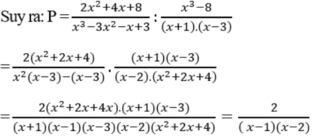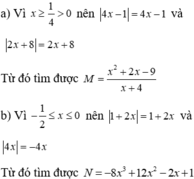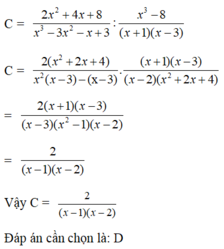
Hãy nhập câu hỏi của bạn vào đây, nếu là tài khoản VIP, bạn sẽ được ưu tiên trả lời.


\(a,\Rightarrow4x^2-20x-4x^2+3x+4x-3=5\\ \Rightarrow-13x=8\Rightarrow x=-\dfrac{8}{13}\\ b,\Rightarrow3x^2-10x+8-3x^2+27x=-3\\ \Rightarrow17x=-11\Rightarrow x=-\dfrac{11}{17}\\ c,\Rightarrow\left(x+3\right)\left(2-x\right)=0\Rightarrow\left[{}\begin{matrix}x=-3\\x=2\end{matrix}\right.\\ d,\Rightarrow2x\left(4x^2-25\right)=0\\ \Rightarrow2x\left(2x-5\right)\left(2x+5\right)=0\Rightarrow\left[{}\begin{matrix}x=0\\x=\dfrac{2}{5}\\x=-\dfrac{2}{5}\end{matrix}\right.\\ e,Sửa:\left(4x-3\right)^2-3x\left(3-4x\right)=0\\ \Rightarrow\left(4x-3\right)^2+3x\left(4x-3\right)=0\\ \Rightarrow\left(4x-3\right)\left(7x-3\right)=0\Rightarrow\left[{}\begin{matrix}x=\dfrac{3}{4}\\x=\dfrac{3}{7}\end{matrix}\right.\)
a.
4x(x-5) - (x-1)(4x-3)-5=0
4x^2-20x-4x^2+3x+4x+3=0
(4x^2-4x^2)+(-20x+3x+4x)+3=0
13x+3 = 0
13x=-3
x=-3/13
b,
(3x-4)(x-2)-3x(x-9)+3=0
3x^2-6x-4x+8 - 3x^2+27x+3=0
(3x^2-3x^2)+(-6x-4x+27x)+(8+3)=0
17x+11=0
17x=-11
x=-11/17
c, 2(x+3)-x^2-3x=0
2(x+3) - x(x+3)=0
(x+3)(2-x)=0
TH1: x+3 = 0; x=-3
TH2: 2-x=0;x=2

a) Ta có: \(2-x=2\left(x-2\right)^3\)
\(\Leftrightarrow-\left(x-2\right)-2\left(x-2\right)^3=0\)
\(\Leftrightarrow\left(x-2\right)\left[1+2\left(x-2\right)^2\right]=0\)
\(\Leftrightarrow x-2=0\)
hay x=2
b) Ta có: \(8x^3-72x=0\)
\(\Leftrightarrow8x\left(x^2-9\right)=0\)
\(\Leftrightarrow x\left(x-3\right)\left(x+3\right)=0\)
\(\Leftrightarrow\left[{}\begin{matrix}x=0\\x=3\\x=-3\end{matrix}\right.\)
Vậy: S={0;3;-3}
c) Ta có: \(\left(x-1.5\right)^6+2\left(1.5-x\right)^2=0\)
\(\Leftrightarrow\left(x-1.5\right)^2\left[\left(x-1.5\right)^4+2\right]=0\)
\(\Leftrightarrow x-1.5=0\)
hay x=1,5
d) Ta có: \(2x^3+3x^2+3+2x=0\)
\(\Leftrightarrow x^2\left(2x+3\right)+\left(2x+3\right)=0\)
\(\Leftrightarrow2x+3=0\)
\(\Leftrightarrow2x=-3\)
hay \(x=-\dfrac{3}{2}\)
e) Ta có: \(x^2\left(x+1\right)-x\left(x+1\right)+x\left(x-1\right)=0\)
\(\Leftrightarrow x\left(x+1\right)\left(x-1\right)+x\left(x-1\right)=0\)
\(\Leftrightarrow x\left(x-1\right)\left(x+2\right)=0\)
\(\Leftrightarrow\left[{}\begin{matrix}x=0\\x=1\\x=-2\end{matrix}\right.\)
Vậy: S={0;1;-2}
f) Ta có: \(x^3-4x-14x\left(x-2\right)=0\)
\(\Leftrightarrow x\left(x-2\right)\left(x+2\right)-14x\left(x-2\right)=0\)
\(\Leftrightarrow x\left(x-2\right)\left(x-12\right)=0\)
\(\Leftrightarrow\left[{}\begin{matrix}x=0\\x=2\\x=12\end{matrix}\right.\)
Vậy: S={0;2;12}

a.
$x^4-6x^2+9=0$
$\Leftrightarrow (x^2-3)^2=0$
$\Leftrightarrow x^2-3=0$
$\Leftrightarrow x^2=3$
$\Leftrightarrow x=\pm \sqrt{3}$
b.
$8x^3+12x^2+6x-63=0$
$\Leftrightarrow (8x^2+12x^2+6x+1)-64=0$
$\Leftrightarrow (2x+1)^3=64=4^3$
$\Leftrightarrow 2x+1=4$
$\Leftrightarrow x=\frac{3}{2}$
c. $(3-2x)^2-25=0$
$\Leftrightarrow (3-2x)^2-5^2=0$
$\Leftrightarrow (3-2x-5)(3-2x+5)=0$
$\Leftrightarrow (-2-2x)(8-2x)=0$
$\Leftrightarrow -2-2x=0$ hoặc $8-2x=0$
$\Leftrightarrow x=-1$ hoặc $x=4$
d.
$6(x+1)^2-2(x+1)^3+2(x-1)(x^2+x+1)=1$
$\Leftrightarrow (x+1)^2[6-2(x+1)]+2(x^3-1)=1$
$\Leftrightarrow (x+1)^2(4-2x)+2x^3-3=0$
$\Leftrightarrow 6x+1=0$
$\Leftrightarrow x=\frac{-1}{6}$
e. $(x-2)^2-(x-2)(x+2)=0$
$\Leftrightarrow (x-2)[(x-2)-(x+2)]=0$
$\Leftrightarrow (x-2)(-4)=0$
$\Leftrightarrow x-2=0$
$\Leftrightarrow x=2$
f. $x^2-4x+4=25$
$\Leftrightarrow (x-2)^2=5^2=(-5)^2$
$\Leftrightarrow x-2=5$ hoặc $x-2=-5$
$\Leftrightarrow x=7$ hoặc $x=-3$

3: =>x+3>=0 và x-2<=0
=>-3<=x<=2
4: =>4x^2-4x+3x-3<x^2-2x+1
=>3x^2+x-2<0
=>3x^2+3x-2x-2<0
=>(x+1)(3x-2)<0
=>-1<x<2/3
2: =>x^4-8x>0
=>x(x^3-8)>0
=>x>2 hoặc x<0

2 x 2 + 4 x + 8 x 3 - 3 x 2 - x + 3 : P = x 3 - 8 x + 1 x - 3


Pt tương đương với 4x^2+ 2x-8x-4-4x^2- 4x=0
Tương Đương Với -10x-4=0
Tương đương với x= -2/5
Vậy Pt Có Tập Ngiêm S= {-2/5 }

a: \(x^2+4x+4=x^2+2\cdot x\cdot2+2^2=\left(x+2\right)^2\)
b: \(4x^2-4x+1=\left(2x\right)^2-2\cdot2x\cdot1+1^2=\left(2x-1\right)^2\)
c: \(2x-1-x^2\)
\(=-\left(x^2-2x+1\right)=-\left(x-1\right)^2\)
d: \(x^2+x+\dfrac{1}{4}=x^2+2\cdot x\cdot\dfrac{1}{2}+\left(\dfrac{1}{2}\right)^2=\left(x+\dfrac{1}{2}\right)^2\)
e: \(9-x^2=3^2-x^2=\left(3-x\right)\left(3+x\right)\)
g: \(\left(x+5\right)^2-4x^2=\left(x+5+2x\right)\left(x+5-2x\right)\)
\(=\left(5-x\right)\left(5+3x\right)\)
h: \(\left(x+1\right)^2-\left(2x-1\right)^2\)
\(=\left(x+1+2x-1\right)\left(x+1-2x+1\right)\)
\(=3x\left(-x+2\right)\)
i: \(=x^2y^2-4xy+4-3\)
\(=\left(xy-2\right)^2-3=\left(xy-2-\sqrt{3}\right)\left(xy-2+\sqrt{3}\right)\)
k: \(=y^2-\left(x-1\right)^2\)
\(=\left(y-x+1\right)\left(y+x-1\right)\)
l: \(=x^3+3\cdot x^2\cdot2+3\cdot x\cdot2^2+2^3=\left(x+2\right)^3\)
m: \(=\left(2x\right)^3-3\cdot\left(2x\right)^2\cdot y+3\cdot2x\cdot y^2-y^3=\left(2x-y\right)^3\)

<=> 3 ( x3 - 1) - 4x2 - 4x - 4 =0
<=> 3x3 - 3 - 4x2 - 4x - 4 = 0
<=> -x2 - 4x - 7 = 0
<=> - ( x2 + 4x + 4 + 3) = 0
<=> - ( x + 2 )2 - 3 = 0
vì ( x + 2 )2 >= 0 V x
<=> - (x + 2) 2 <= 0 V x
<=> - (x + 2) 2 - 3 <= -3
phương trình vô nghiệm
<=> 3 ( x3 - 1) - 4x2 - 4x - 4 =0
<=> 3x3 - 3 - 4x2 - 4x - 4 = 0
<=> -x2 - 4x - 7 = 0
<=> - ( x2 + 4x + 4 + 3) = 0
<=> - ( x + 2 )2 - 3 = 0
vì ( x + 2 )2 >= 0 V x
<=> - (x + 2) 2 <= 0 V x
<=> - (x + 2) 2 - 3 <= -3
phương trình vô nghiệm

